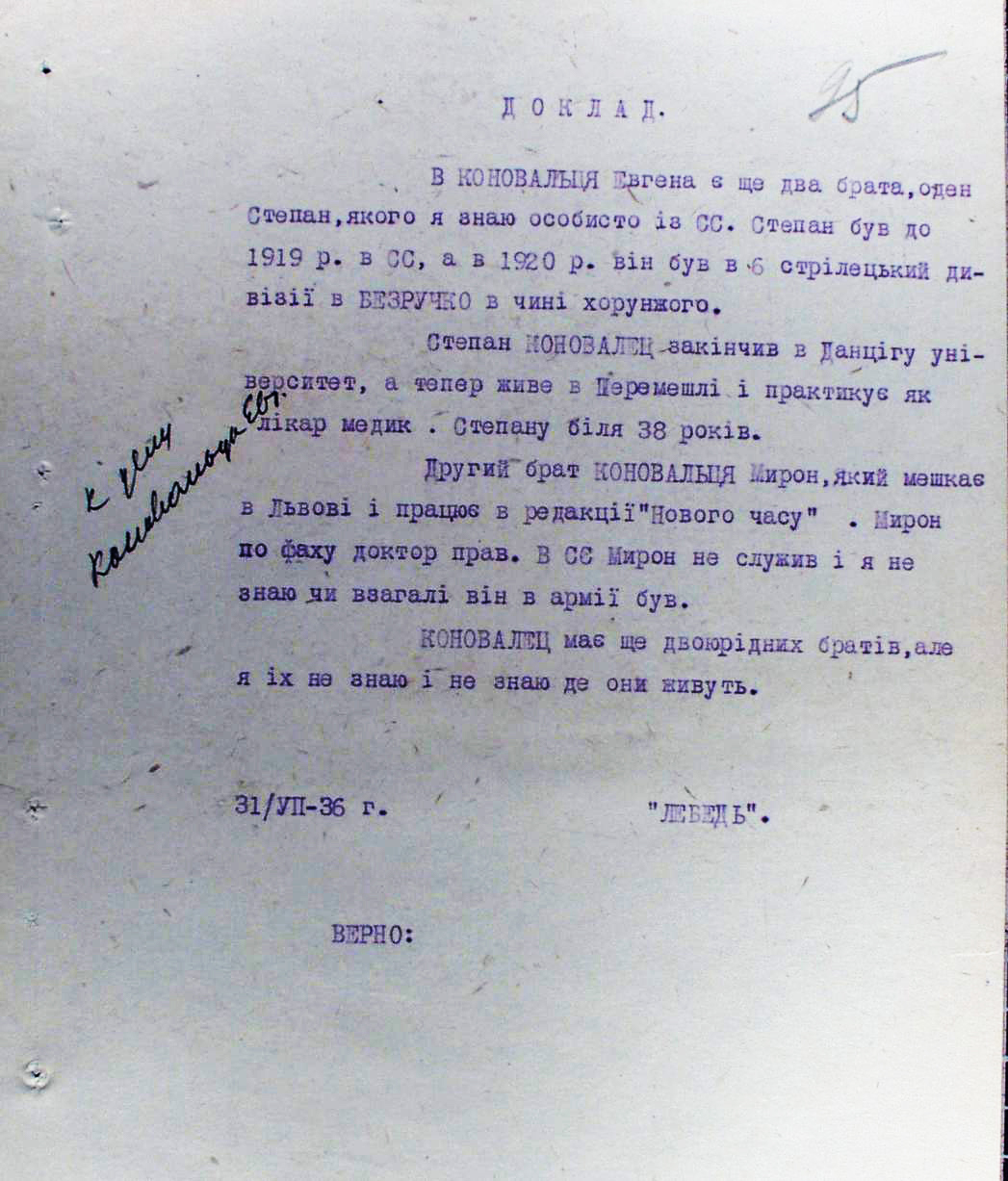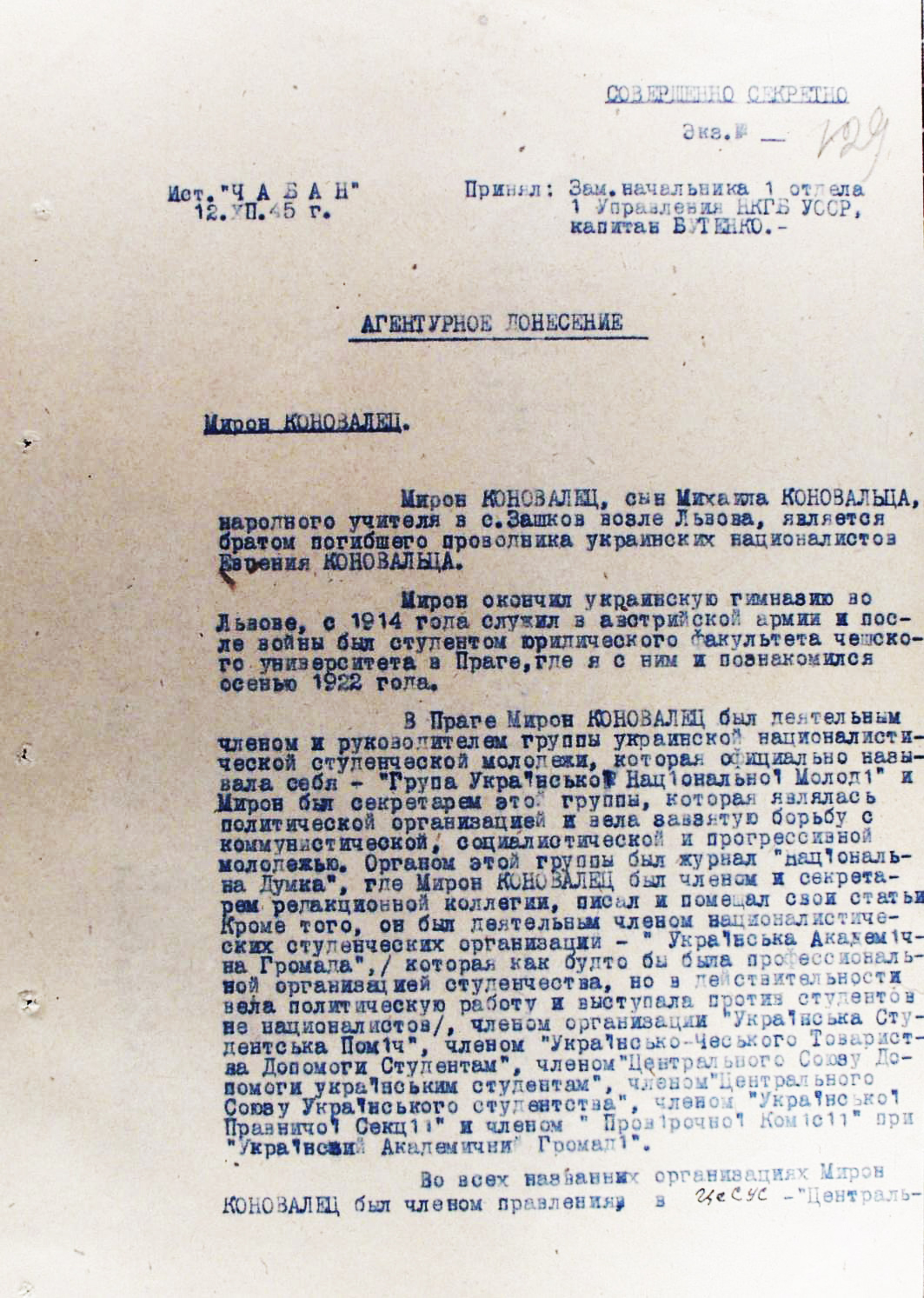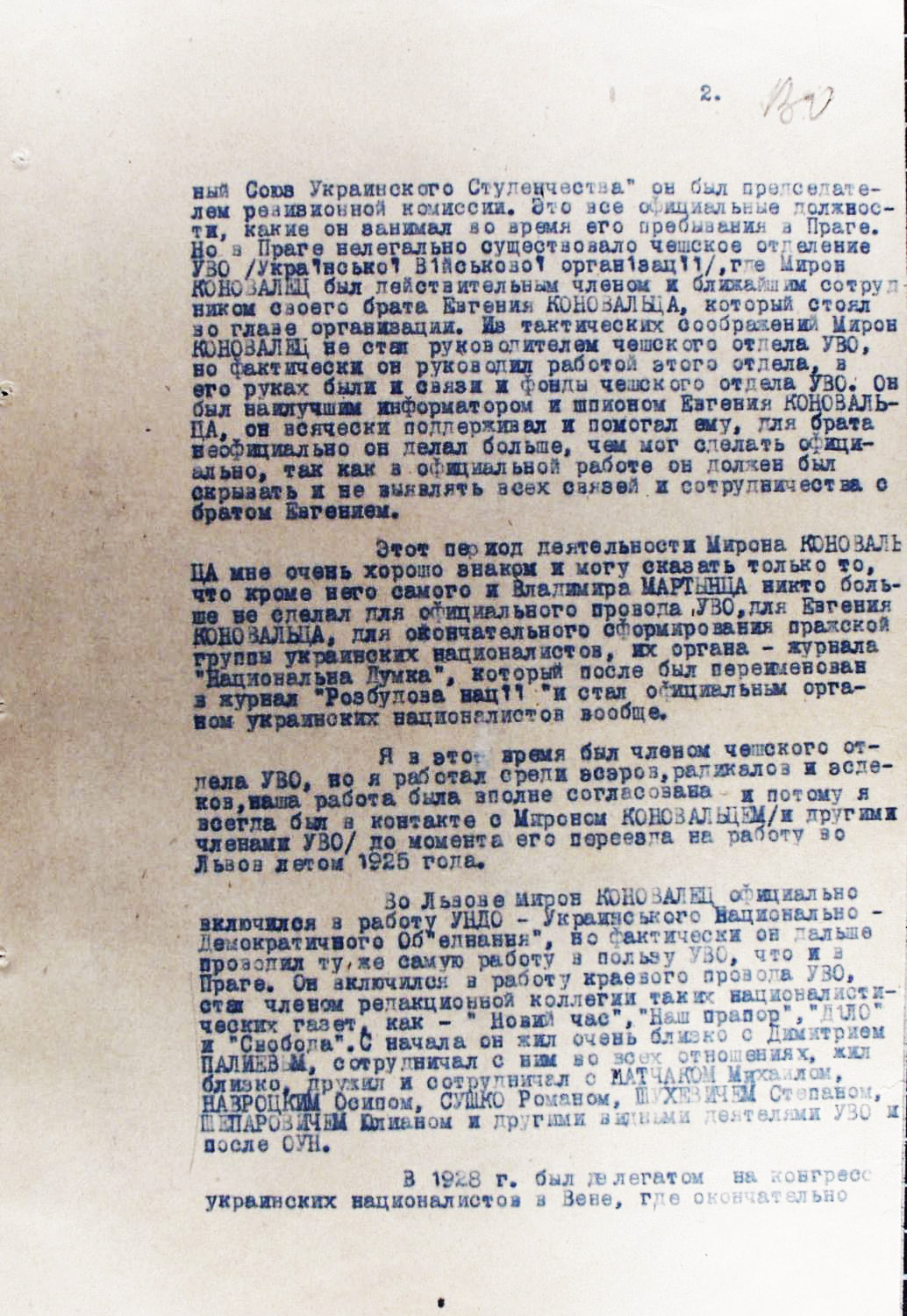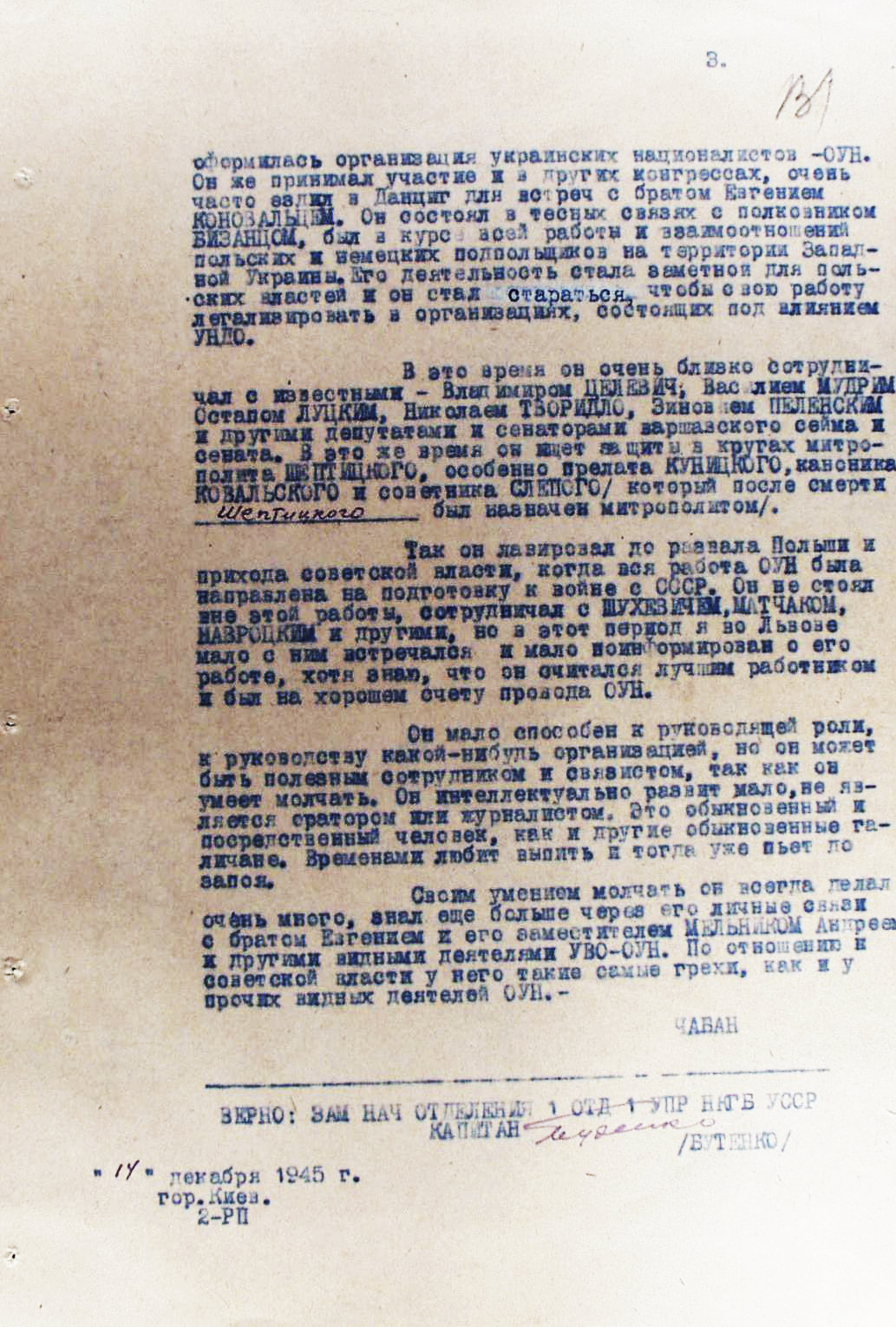Myron Konovalets. “He Never Advertised What He Was Doing for His Brother”
7/25/2025
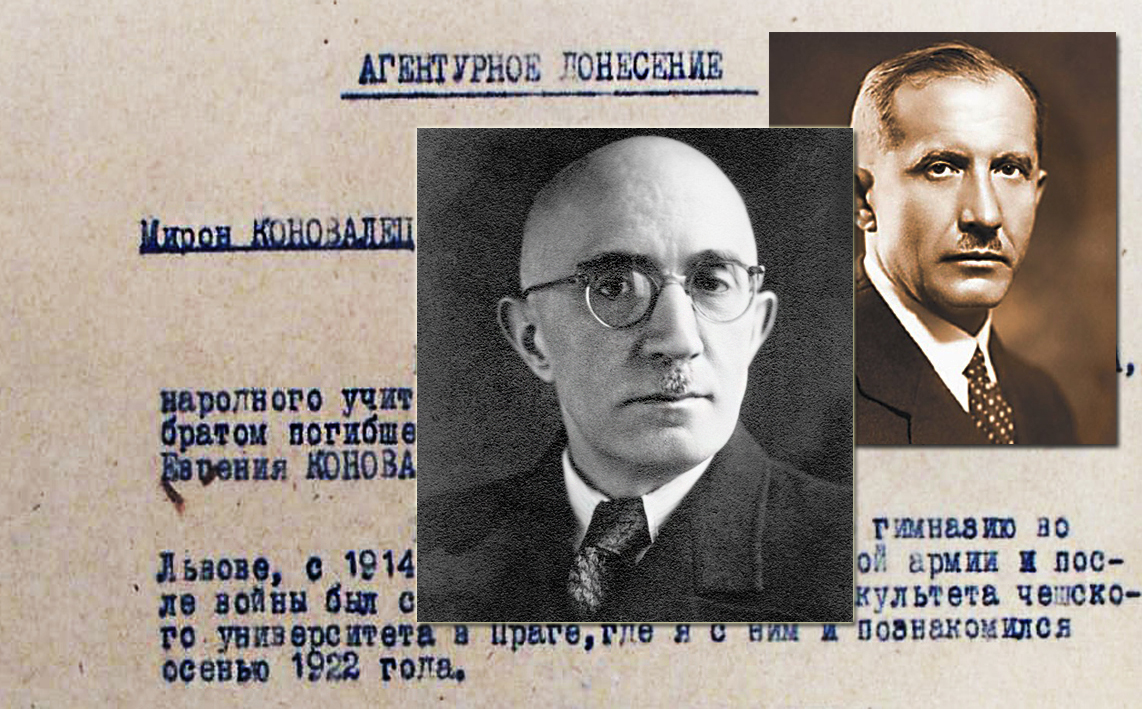
Unlike Yevhen Konovalets, who appears in many cases and hundreds of notes and intelligence reports of the nkvd, there is very little information about his brother Myron. At this, his role in the activities of the Ukrainian Military Organization (UVO) and OUN was quite important, albeit not very public. On the eve of the anniversary of his birth (July 22, 1894), in the archival funds of the Foreign Intelligence Service of Ukraine, we managed to find and study several interesting documents that confirm this and complement the few pages of the biography of M. Konovalets – a Doctor of Law, a talented journalist and an active public figure.
The first fragmentary information about the younger brothers of Ye. Konovalets was received by the chekists from the agent “Lebed” (Vasyl Khomyak). In 1936, he reported as follows:
“Yevhen Konovalets has two brothers. One is Stepan, whom I know personally from the Sich Riflemen. Stepan was in the Sich Riflemen until 1919, and in 1920 he was in Bezruchko’s 6th Rifle Division in the rank of Khorunzhyi.
Stepan Konovalets graduated from the University of Danzig and now lives in Przemyśl and practices as a doctor. Stepan is about 38 years old”.
(FISU. – F. 1. – Case 6964. – P. 95).
In reality, Stepan was 40 years old at that time. He was born on May 15, 1896 and was the youngest of the brothers. In another report, “Lebed” informed that Stepan was the commander of a chota in the Sich Riflemen’s unit and that the relationship between them was not “just like that between good acquaintances, but like between close friends”.
The absence of other information about the youngest of the brothers is explained only by the fact that he was not engaged in political activities, worked as a doctor and mostly took care of his elderly parents in Zashkiv in Lviv region. Although this did not save him from the bolshevik repressive machine. According to open sources, at the end of World War II, he left for Austria, where he was soon traced by representatives of soviet secret services. After his arrest and investigation, he was exiled to Siberia, where he died on May 14, 1952.
About Ye. Konovalets’s brother Myron, “Lebed” reported that at that time he was a Doctor of Law, lived in Lviv and worked in the editorial office of “Novyi Chas”. At this, he pointed out that Myron had not served in the Sich Riflemen and that he could not say whether Myron Konovalets had served in the army at all.
Another agent under the code name “Chaban”, who knew the middle brother of Konovaletses better, provides more detailed information about him. It is this intelligence report, dated December 12, 1945, that makes it possible to learn more about Myron’s political and social activities, his real contribution to the liberation struggle and to understand why he mostly remained in the shadow of his elder brother.
“Myron graduated from the Ukrainian Gymnasium in Lviv,” reads the report, “since 1914 he served in the Austrian Army and after the war he was a student at the Faculty of Law of the Czech University in Prague, where I met him in the autumn of 1922” (FISU. – F. 1. – Case 6964. – P. 129).
“Chaban” told about the life of M. Konovalets before 1922 only fragmentarily. Obviously, he had no information about it. It is known from open sources that Myron was born on July 22, 1894. In 1913 he graduated from the branch of the Academic Gymnasium in Lviv. In October 1918, he was a member of the Ukrainian General Military Committee in Lviv. He was an active participant in the November Chyn (also known as Zryv or Revolution – Transl.) – an armed uprising organized by Ukrainians in Lviv on the night of October 31 to November 1, 1918, aimed at establishing Ukrainian power in Halychyna after the collapse of the Austro-Hungarian Empire. He fought in the Ukrainian Galician Army in the rank of Poruchnyk (Lieutenant). After the defeat of the liberation struggle of 1917-1921, he was a member of the Ukrainian Military Organization, the head of which was Yevhen Konovalets, press referent of the Organization’s expositura in Czechoslovakia.
“Chaban” provided quite detailed information about the Czech period of M. Konovalets’s life and work. He pointed out that Myron was the Secretary of the “Group of Ukrainian Nationalist Student Youth” – a political organization that waged a fierce struggle against communist youth. The printed organ of this group was the magazine “Natsionalna Dumka”, where Myron was the secretary of the editorial board and at the same time wrote articles for the magazine. In addition, he was an active member of such socio-political organizations as “Ukrainska Akademichna Hromada”, Ukrainska Studentska Pomich”, “Ukrainsko-Cheske Tovarystvo Dopomohy Studentam”, “Ukrainska Pravnycha Sektsiya”, “Tsentralnyi Soiuz Ukrainskoho Studenstva”. In almost all of these organizations, he was a board member or held certain leadership positions.
More attention in the intelligence report is paid to M. Konovalets’s activities in the Czech branch of the UVO. “For tactical reasons,” points out the document, “Myron Konovalets did not become the head of the Czech department of the UVO, but in fact he managed the work of that department, connections and funds of the Czech department of the UVO were in his hands. He was Yevhen Konovalets’s best informant and spy, he supported and helped him in every possible way. Unofficially, he had done more for his brother than he could have done officially, since in his official work he would have had to hide all his connections and the very fact of cooperation with his brother” (FISU– F. 1. – Case 6964. – P. 130).
“Chaban” emphasized that except for Myron Konovalets and Volodymyr Martynets, no one could do more to organize and deploy the work of the UVO in the Czech territory and the publication of the magazine “Natsionalna Dumka”, which soon received the name “Rozbudova Natsii” and became the official organ of Ukrainian nationalists.
The agent further pointed out that after moving to Lviv in the summer of 1925, Myron Konovalets actively participated in the activities of the Ukrainian National Democratic Union (UNDO), but in fact continued to carry out the same work for UVO as in Prague. He joined the work of the regional Provid of the UVO, became a member of the editorial board of the newspapers “Novyi Chas”, “Nash Prapor”, “Dilo” and “Svoboda”. At that time, he co-worked with Dmytro Paliev, Mykhailo Matchak, Osyp Navrotskyi, Roman Sushko, Stepan Shukhevych, Yulian Sheparovych, Volodymyr Tselevich, Vasyl Mudryi, Ostap Lutskyi, Zenon Pelenskyi and other Ukrainian figures. He had close contacts with Colonel Alfred Bizanets, a former serviceman of the Ukrainian Galician Army and the Ukrainian People’s Republic. He repeatedly visited Danzig to see Yevhen Konovalets and receive instructions. He participated in the work of conferences and congresses of the OUN.
During the occupation of Poland in the years of the Second World War, as noted by “Chaban”, he did not often see M. Konovalets, so he could not say anything specific about the latter’s activity at that time. Nevertheless, he pointed out that others considered E. Konovalets’s brother “the best employee who stood well with the OUN Provid”. “Chaban” also stated the following:
“He is little capable of a leading role, of managing some organization, but he can be a useful employee and liaison, because he can be silent... He always did a lot thanks to his ability to remain silent, he knew even more through his personal ties with his brother Yevhen and his deputy Andrii Melnyk and other leaders of the UVO – OUN”
(FISU – F. 1. – Case 6964. – P. 131).
All these characteristics and evaluations of Myron Konovalets’s activity make it possible to look at his figure somewhat from a different angle – not only as a brother of the leader of the OUN Provid, but also as a self–sufficient personality who contributed to the development of UVO and OUN and did not advertise his merits.
After the Second World War, M. Konovalets lived in Munich. At the end of the war, the nkgb of the Ukrainian ssr opened a case against him. But, as evidenced by declassified documents from the archives of the Foreign Intelligence Service of Ukraine, no proper cultivation was conducted. Only one report was attached to the case about his activities as the editor of the official bulletin of the “Ukrainian Central Committee”, about legal assistance to Ukrainians and collecting materials on the activities of the underground at that time in Western Ukrainian lands and the preparation of leaflets to the Ukrainian population with an explanation of the expediency of continuing the liberation struggle.
At that time, M. Konovalets also worked in Munich as the editor-in-chief of the popular weekly “Khrystyianskyi Holos”, which was published under the auspices of Archbishop Ivan Buchko, and was the Head of the Union of Ukrainian Journalists in Exile. He passed away on October 14, 1980.
